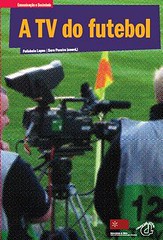Uma interessante reflexão sobre jornalismo por Jay Rosen, no Press Think: The amendment says that people are free to gather together without the intrusion of the state or its representatives. Once gathered, they are free to speak to one another openly and freely. They are further free to write down what they have to say and to share it beyond the immediate place of utterance. For the people to write down what they say and share it. From this right that belongs to all citizens, Carey derives both the original meaning of press freedom, and the most urgent purpose of journalism-- to amplify, clarify and extend what the rest of us produce as a "society of conversationalists." Public conversation is not the pundits or professionals we see on talk shows. It is "ours to conduct," as Carey puts it. The press should help us out. Here emerges his different faith. For when "the press sees its role as limited to informing whomever happens to turn up at the end of the communication channel, it explicitly abandons its role as an agency for carrying on the conversation of the culture." How many journalists would say that their most basic task is to "inform" the public? Most, I think. Carey denies it: people inform themselves, he says. Yes, they need reliable news. But news should keep the conversation going among them. How many journalists believe that their profession, journalism, is the "only one mentioned in the Constitution?" Carey denies it. What is mentioned, he says, is the people's right to publish what they discover and think. Press freedom the way the press promotes it derives from that larger right. In Carey's world the religion of the press is properly rooted in the public: "The god term of journalism--the be-all and end-all, the term without which the enterprise fails to make sense, is the public. Insofar as journalism is grounded, it is grounded in the public." If they, the journalists, are supposed to believe in "us," the public, then do we, the public, have to believe in the press? That seems to me a puzzle involving in the last analysis faith.
Quem somos
» Manuel Pinto» Helena Sousa
» Luis Antonio Santos
» Joaquim Fidalgo
» Felisbela Lopes
» Madalena Oliveira
» Sara Moutinho
» Daniela Bertocchi
» Sergio Denicoli
Últimos posts
» SJ rejeita limitações à liberdade de imprensa O...» Envolver multinacionais no combate à "baixaria" na...
» Sena Santos A notícia do abandono da RDP por pa...
» Jornalismo digital e cibercultura A última actu...
» Mais uma inovação tecnológica ao serviço dos blogg...
» Textos Alguns textos recentemente colocados na ...
» Perfil do jornalista digital Com base num estud...
» Prémio de crónica João Carreira Bom A Sociedad...
» Site sobre a União Europeia para jornalistas O ...
» Jornalista intimada a revelar fontes A história...
Ligações
-
» Aula de Jornalismo
» Atrium-Media e Cidadania
» Jornalismo Digital
» Ponto Media
» ContraFactos e Argumentos
» JornalismoPortoNet
» Irreal TV
» Indústrias Culturais
» Blogouve-se
» Net FM
» As Imagens e Nós
» Retórica e Persuasão
» Fotojornalismos
» Charme da Bloguesia
» Mas Certamente que Sim
» Sopa de Pedra
» Educomunicação
» Travessias
» A Rádio em Portugal
» Webcom
» A nossa Rádio
» Rádio e Jornalismo
» Engrenagem
» Nós Media
» Observatório da Imprensa
» Blog do Provedor
» Intermezzo
» Jornalismo & Internet
» Midiablog
» Código Aberto
» Ponto de Análises
» Tiscar.com
» First Draft
» e-Periodistas
» Weblog Blog
» Public Journalism Net
» Media Network
» eCuaderno>
» Periodistas 21
» PressThink
» MétaMédias
» Deuze Blog
» Blog Clipping
» MediaTIC
» Le blog des medias
» Le blog TV news
» The OmbudsGod
» E-Media Tidbits
» Romenesko
» Dan Gillmor
» Editors Weblog
» Is Journalism dead?
» JP Cloutier
» Des Gadgets aux Réseaux
» Periodismo Global
» Comunicacion Politica
» Comunisfera
» Loïc le Meur
» D. Schneidermann
Arquivos
» abril 2002» maio 2002
» junho 2002
» julho 2002
» agosto 2002
» setembro 2002
» outubro 2002
» novembro 2002
» dezembro 2002
» janeiro 2003
» fevereiro 2003
» março 2003
» abril 2003
» maio 2003
» junho 2003
» julho 2003
» agosto 2003
» setembro 2003
» outubro 2003
» novembro 2003
» dezembro 2003
» janeiro 2004
» fevereiro 2004
» março 2004
» abril 2004
» maio 2004
» junho 2004
» julho 2004
» agosto 2004
» setembro 2004
» outubro 2004
» novembro 2004
» dezembro 2004
» janeiro 2005
» fevereiro 2005
» março 2005
» abril 2005
» maio 2005
» junho 2005
» julho 2005
» agosto 2005
» setembro 2005
» outubro 2005
» novembro 2005
» dezembro 2005
» janeiro 2006
» fevereiro 2006
» março 2006
» abril 2006
» maio 2006
» junho 2006
» julho 2006
» agosto 2006
» setembro 2006
» outubro 2006
» novembro 2006
» dezembro 2006
» janeiro 2007
Livros


» Felisbela Lopes e Sara pereira (orgs) A TV do Futebol; Porto: Campo das Letras
» Televisão e cidadania. Contributos para o debate sobre o serviço público. Manuel Pinto (coord.), Helena Sousa, Joaquim Fidalgo, Helena Gonçalves, Felisbela Lopes, Helena Pires, Luis António Santos. 2ª edição, aumentada, Maio de 2005. Colecção Comunicação e Sociedade. Campo das Letras Editores.
» Weblogs - Diário de Bordo. António Granado, Elisabete Barbosa. Porto Editora. Colecção: Comunicação. Última Edição: Fevereiro de 2004.
» Em nome do leitor. As colunas do provedor do "Público". Joaquim Fidalgo. Coimbra: Ed. Minerva. 2004
» Outras publicações do CECS
Eventos
» Conferência: A Nova Entidade Reguladora no quadro das políticas de Comunicação em Portugal (2006)» I Congresso Internacional sobre Comunicação e Lusofonia (2005)
» Jornadas ?Dez Anos de Jornalismo Digital em Portugal: Estado da Arte e Cenários Futuros? (2005)
» Todos os eventos
0 resposta(s) para “”
Responder